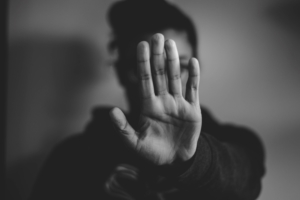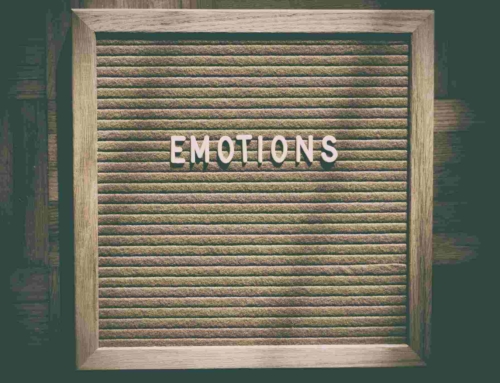Even the healthiest of relationships sometimes goes through times of struggle and disconnect. Life circumstances, differing expectations, personality clashes, and countless other factors can all contribute to friction in any relationship. However, there is a vast difference between a relationship that is suffering from the natural bumps and rough patches that life brings and an abusive relationship.
 To describe a relationship as “abusive” may conjure any number of scenarios, and it can be scary and confusing to acknowledge the potentially abusive aspects of a personal relationship – even when the “red flags” seem to be staring us in the face. An abusive relationship is one in which the needs and feelings of one or both individuals in the relationship are ignored, dismissed, or otherwise treated as inconsequential.
To describe a relationship as “abusive” may conjure any number of scenarios, and it can be scary and confusing to acknowledge the potentially abusive aspects of a personal relationship – even when the “red flags” seem to be staring us in the face. An abusive relationship is one in which the needs and feelings of one or both individuals in the relationship are ignored, dismissed, or otherwise treated as inconsequential.
The abuser might do this intentionally and with full awareness, or unintentionally, through a lack of self-awareness or recognition of their harmful tendencies. Regardless, abuse can take shape in diverse ways in a relationship. While every relationship is unique, broadly speaking, there are certain dynamics that, in any relationship, can be called “abusive,” and rightly so.
So, whether it relates to a parent-child dynamic, a romantic relationship, or how siblings and colleagues relate to one another, there are ways that human beings relate to one another that lead to flourishing, and other ways that undermine their dignity and sense of worth as beings created in God’s image.
Below are some of the hallmarks of an abusive relationship; if you find signs of these in a relationship, they should raise red flags alerting you that the relationship is potentially harmful and needs to be addressed seriously.
Verbal and emotional abuse
Our words and actions have enormous potential to bless or harm others. Proverbs 18:21 says that “the tongue has the power of life and death” (NIV), and the many warnings in the Bible to use our words to build others up and not tear them down alert us to this power.
 Words that are spoken to a child can stay with them throughout their life, for good or for ill. A spouse can undermine the confidence of their partner through the negative things they say about them. A few of the signs of verbal and emotional abuse include:
Words that are spoken to a child can stay with them throughout their life, for good or for ill. A spouse can undermine the confidence of their partner through the negative things they say about them. A few of the signs of verbal and emotional abuse include:
Being shouted at. This is one of the more obvious acts of verbal abuse, and it can happen in parent-child situations as well as at work, between peers, or any relationship.
Being insulted or mocked. There’s a distinct difference between mutual joking and insulting. When someone’s dignity or boundaries are violated, the interaction begins to look a lot more like abuse than friendship or good-natured rapport. Being insulted or mocked can take the form of name-calling, or any type of humiliation that is intended to make you feel bad about yourself.
Gaslighting. Gaslighting is a type of emotional abuse where a person is made to doubt their memory, intuition, perceptions, or judgment by another person. Gaslighting is a way of exerting control over another person, and it happens in all types of relationships, though perhaps most commonly in romantic ones.
When your concerns are met with statements such as “You’re imagining things,” “You’re just too sensitive,” “That never happened,” “The problem isn’t me, it’s you,” and so on, that’s gaslighting at work.
Being constantly criticized. None of us is perfect, and we could all stand to improve in any number of areas in our lives. Constructive criticism helps us to become better, more confident people. The kind of criticism that constitutes verbal abuse is persistent, is particularly harsh, is aimed at the person rather than the behavior, and seeks to control and/or hurt the other person.
Manipulation. In whatever configuration of relationship, there are two or more people who have different desires and preferred courses of action. One way to pull together in the same direction is through persuasion and compromise, in which the people involved treat one another with respect and appeal to reason in order to chart a course together.
 Manipulation is a form of control, a way of making someone do what they’d rather not do. A statement such as, “If you loved me, you’d sleep with me” is a pernicious form of manipulation. Other manipulative or threatening statements may include, “If you don’t do this for me, I’ll hurt myself,” or “If you do this, you’ll be showing that you only care about yourself.”
Manipulation is a form of control, a way of making someone do what they’d rather not do. A statement such as, “If you loved me, you’d sleep with me” is a pernicious form of manipulation. Other manipulative or threatening statements may include, “If you don’t do this for me, I’ll hurt myself,” or “If you do this, you’ll be showing that you only care about yourself.”
Dr. Jekyll and Mr. Hyde. One sign of an abusive situation is when the abusive person reserves their hurtful behavior for when you’re alone. If you are with them in public, they may treat you completely differently than when in private. This dynamic relates back to gaslighting; it causes the abused to question their own perception of the actions and intentions of the abuser.
Accusations and blame. When someone repeatedly says you’ve done something wrong when you haven’t, or they blame you for their behavior, that’s a sign of an abusive relationship. Everyone is responsible for their own behavior, and shifting blame onto the other signals that something is off in that relationship.
When these behaviors are evident in a relationship, especially if there is a pattern of such behaviors, this strongly indicates there is an abusive dynamic in the relationship.
Physical abuse
Another form of abuse that can take root in a relationship is physical abuse. Some of the signs include:
Being subjected to physical violence, or the threat of it. We all want to feel safe, and physical violence undermines that and our overall well-being. Someone laying hands on you, either by shoving you, slapping, punching, forcibly picking you up, or pinning you down is a form of physical abuse.
However, physical abuse may also manifest in the person pounding their fists, hitting walls, throwing things around the room, or blocking your way to prevent you from leaving the room. While they aren’t touching you in any of these scenarios, their actions are threatening, controlling, and may lead to more direct violence.
 Being coerced to engage in any type of sexual activity with someone you don’t want to, or when you don’t want to. Sexual abuse can take place in any relationship, including in a marriage. In the last several years, our understanding of the nuances of informed consent has deepened, but the bottom line is that if someone doesn’t freely, consciously, and clearly assent to any sexual activity but is still forced or manipulated into doing so, this is abuse.
Being coerced to engage in any type of sexual activity with someone you don’t want to, or when you don’t want to. Sexual abuse can take place in any relationship, including in a marriage. In the last several years, our understanding of the nuances of informed consent has deepened, but the bottom line is that if someone doesn’t freely, consciously, and clearly assent to any sexual activity but is still forced or manipulated into doing so, this is abuse.
Being deprived of food, shelter, clothing, health care, and other essentials. Every human being has a right to the necessities of life. In relationships with a skewed power dynamic, such as between a parent and child, the child depends on their parents for these things, and so the withholding of these necessities constitutes a form of physical abuse.
In other situations, for instance, where one spouse earns the family income, controlling those funds to withhold these necessities from others in the family is, at minimum, highly problematic.
What can you do if you’re in an abusive relationship?
If you’re being verbally, emotionally, or physically abused, know that it’s not your fault. While abusive behavior toward you may make you believe otherwise, you are worthy of love and dignity – something that God has gifted every single person. Abuse has the impact of undermining the truth about who we are, which is just one reason among many why ending the abuse and recovering your sense of worth is critical to your well-being.
Recognizing the potentially abusive dynamics in a personal relationship can be a confusing and painful process. If you suspect you’re in an abusive relationship, talk with a trusted individual, such as a licensed therapist. They can help you identify what’s going on and provide you with the tools you need to address it.
In some situations, the abuse is imminently life-threatening, and you may need to take extraordinary measures to be safe. Speaking to trusted individuals such as friends, or a counselor connected to a safe haven who can help you prepare an exit plan, will go a long way in making sure you and any loved ones get out of the situation safely.
There are hotlines and websites you can access such as the National Domestic Abuse Hotline (800-799-7233), DomesticShelters.org, or Love Is Respect, a national dating abuse hotline; these will help you address questions or concerns you may have.
Photos:
“Woman by Window”, Courtesy of Diego San, Unsplash.com, CC0 License; “Broken Heart”, Courtesy of Kelly Sikkema, Unsplash.com, CC0 License; “Talk to the Hand”, Courtesy of Nadine Shaabana, Unsplash.com, CC0 License; “Coffee Chat”, Courtesy of Prisiclla Du Preez, Unsplash.com, CC0 License









